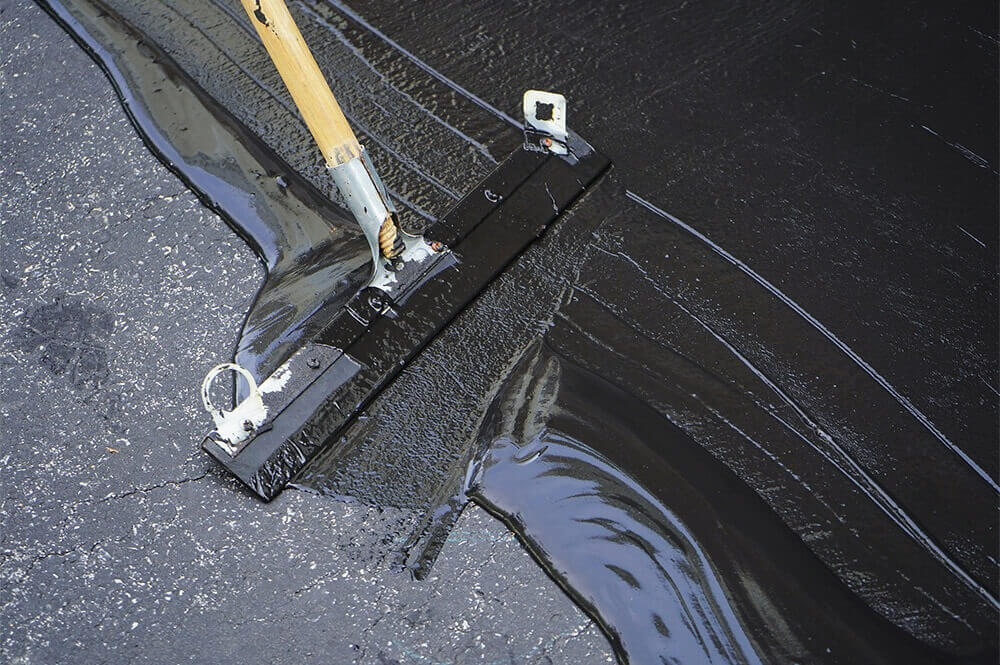Sealing new asphalt driveways is a scientific endeavor in Jackson, MI. This article explores this intricate process, discussing optimal timing and the factors affecting it.
A step-by-step guide for driveway sealing is provided, along with common mistakes to avoid.
Lastly, the focus shifts to crucial maintenance tips post-sealing, ensuring the longevity of the sealed asphalt surface.
The objective is to revolutionize conventional understandings and practices surrounding asphalt driveway sealing.
The Importance of Sealing New Asphalt Driveways
The significance of sealing new asphalt driveways stems from its ability to enhance durability, improve appearance, and prevent damage caused by weather conditions and vehicular traffic. A well-sealed asphalt driveway contributes significantly to the asphalt’s longevity, ensuring an extended, cost-effective lifespan in the long run.
A choice must be made among the various sealant types available today to maintain this durability. Each type offers certain advantages over others concerning specific conditions and uses. For instance, coal-tar emulsion sealants provide robust resistance against water seepage, oil leaks, and UV rays, while acrylic-resin-based sealants offer superior color retention and adherence properties.
Furthermore, innovative advancements have led to the development of eco-friendly bio-based asphalt sealers, which reduce environmental impact without compromising performance or longevity. These cutting-edge solutions preserve aesthetic appeal and uphold structural integrity under varying weather conditions.
Factors Determining the Optimal Time for Sealing Asphalt
Several considerations, such as weather conditions, pavement age, and use frequency, play critical roles in determining the ideal time for applying a protective layer to bituminous surfaces. Climate impacts significantly drive these factors.
For instance, sealing should ideally occur during dry periods when temperatures are consistently above 50 degrees Fahrenheit. It ensures optimal adhesion and curing of the sealing material.
The selection from various sealing material options also influences timing decisions. Some sealants require a longer curing period before exposure to vehicular traffic; others can withstand use sooner after application. These options offer flexibility depending on urgency or timelines associated with usage demands.
Moreover, consideration is given to the pavement’s age as new asphalt generally requires up to a year before sealant application for oils within it to oxidize sufficiently – a process hastened by frequent use and warmer climates. However, earlier application might be necessary in colder regions where deterioration due to freezing and thawing cycles is rampant.
In essence, detailed knowledge about local climate impacts alongside understanding different sealing material options helps determine the most opportune moment for effectively preserving bituminous surfaces.
Step-by-Step Process for Sealing Your New Asphalt Driveway
Understanding the step-by-step process involved in preserving bituminous surfaces necessitates an exploration of various stages, from surface preparation to application and curing of the sealant. The initial phase requires meticulous preparation, thoroughly cleaning and patching any existing cracks or voids. It is essential for ensuring a smooth substrate that facilitates optimal adhesion of the sealant.
Sealant selection forms a crucial component in this process. A suitable product should offer resistance against UV rays, water penetration, oil spills, and other weather-induced deterioration factors. Furthermore, it must provide enhanced durability while maintaining aesthetic appeal.
Application techniques significantly influence the longevity and efficacy of asphalt sealing. Utilizing advanced tools like squeegees or spray systems allows uniform distribution across the driveway’s surface area.
Post-application care is equally vital; sufficient curing time ensures robust bonding between asphalt layers and sealant material. Proper maintenance practices, such as regular inspections for potential damages, enhance longevity and performance.
Common Mistakes to Avoid When Sealing Your Driveway
Common mistakes in driveway sealing can significantly compromise the integrity and longevity of bituminous surfaces. Inadequate surface preparation and improper sealant application are two common errors that can lead to sub-optimal results. Choosing a high-quality sealant specifically suited for bituminous surfaces with superior adhesive properties is critical.
Another frequently overlooked aspect is the impact of weather on the sealing process. Temperature fluctuations can cause the expansion or contraction of asphalt material, affecting its receptiveness to sealants. Applying the sealant under dry conditions is crucial as moisture hinders proper adhesion between sealants and the asphalt surface.
Inadequate cleaning before sealing is another common pitfall. Any dust or debris on the driveway might prevent effective bonding between the asphalt and sealant, reducing its efficacy over time. Rushing through the curing period post-sealant application could result in premature use of driveways, causing unintended damage.
Understanding these common errors can lead to more efficient methods for preserving the durability of bituminous surfaces over extended periods while maintaining their aesthetic appeal.
Maintenance Tips for Your Sealed Asphalt Driveway in Jackson, MI
Maintenance of sealed asphalt driveways necessitates adherence to certain tips, which include regularly inspecting the surface for cracks and promptly repairing them to prevent water seepage and subsequent damage. Innovative driveway cleaning techniques have been developed to efficiently remove dirt, oil stains, and other debris without damaging the sealant or underlying asphalt.
High-pressure washing systems are recommended, followed by applying biodegradable cleaners specifically designed for asphalt surfaces. These advanced solutions effectively eliminate stubborn contaminants while preserving the driveway’s integrity.
In addition to regular cleaning, selecting a quality sealant is pivotal in maintaining a well-preserved driveway. Sealant selection tips suggest opting for products that provide UV protection, resistance to chemicals and oils, and durability against weather conditions. Choosing a sealant that adheres well to an existing surface is crucial while imparting a fresh look.
Ultimately, diligent maintenance coupled with innovative practices can significantly extend an asphalt driveway’s lifespan. It encompasses proactive measures, such as routine inspections for early detection of issues, and reactive measures, like prompt repair work, upon identifying cracks or wear. Consult a professional for more maintenance tips.

